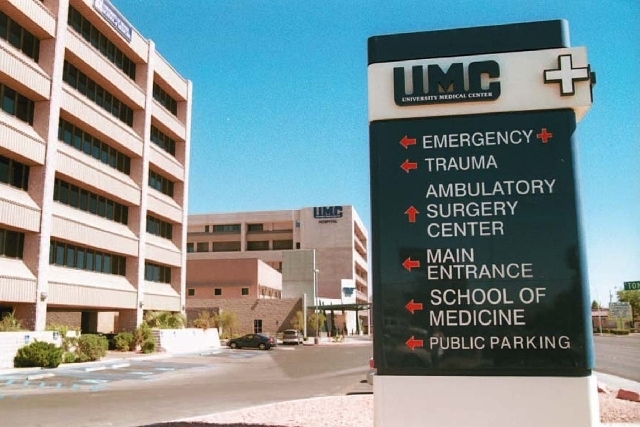Power to the panel: UMC getting new handlers
University Medical Center is getting new power brokers.
Clark County commissioners decided last week to relinquish much of their oversight of the public hospital to a new board of appointed members.
The move is significant for county officials, coming after a decade of wrestling with the question of how the county should oversee the hospital.
The hospital will remain public, but with a new board tasked solely with the job of governing UMC’s affairs. The new board of unelected officials will have wide-ranging powers. For example, they can approve all but the largest contracts without consent from county commissioners. On their own, they can hire and fire the hospital’s chief executive officer.
The move comes at a critical juncture for public hospitals and health care. Many county-run public hospitals throughout the nation have set up separate boards for oversight, and health care issues have grown in complexity and competitiveness.
The newfound power won’t be unbridled, though. County commissioners will remain the trustees of the hospital. In that role, they still have final approval of budgets, which the new board will recommend. And, if commissioners ever decide the new board’s powers are too strong, they can reduce the board’s influence or do away with it entirely.
“It will allow us to create a dedicated board under the commissioners that will provide us with a panel of people who will only have to worry about how we make UMC as successful as it can be,” hospital CEO Brian Brannman said.
BUMPY RIDE TO GET HERE
Getting to this point was a bumpy ride.
At this year’s Nevada Legislature, for example, the county unsuccessfully lobbied for a bill that would have allowed it to put a new governing board in place at UMC.
That effort died, after only four of the seven commissioners supported the bill. The other three commissioners — Chris Giunchigliani, Lawrence Weekly and Tom Collins — even made a trip to Carson City to persuade lawmakers to kill the bill.
The latest effort is the third attempt to shake up the hospital’s oversight in as many years. In 2010, the county formed a UMC advisory board, only to disband it two years later. It also unsuccessfully sought legislative approval to create a hospital governing board.
County officials now say that 2010 effort could have been better.
“Our desired outcome was correct,” Brannman said. “But we didn’t execute it very well. We didn’t put together a package to really train those folks. They were great folks; they were extremely dedicated. But I think we didn’t properly give them the tools.”
The new board is charged with oversight of the hospital’s mission, development of strategic planning and goals, and adoption of plans for reaching goals. It also will approve hospital policies and procedures for UMC’s operation, which includes productivity, patient satisfaction and complaints and the scope of services.
It will hire, fire and evaluate the hospital’s CEO, and approve contracts. The board can approve individual contracts of up to $5 million. The board also can approve contracts with doctors and private medical associations of up to five years long and up to $1 million.
It also will recommend the hospital’s operating and capital budgets to commissioners for approval.
COMMISSION SUPPORT
Weekly is chairman when commissioners act in their capacity as UMC Board of Trustees. He said the time is right for a change.
“I think some of the biggest changes to me would be probably closer oversight and a closer working relationship with the CEO of the hospital,” he said.
He said he moved very cautiously in his decision to delegate authority.
He said UMC needs more attention than the time spent by commissioners, who already have plenty of other duties. Sometimes, he said, a UMC agenda item gets only 10 to 15 minutes of discussion.
“UMC could be a conversation by itself all day long,” he said.
While he opposed the legislation in Carson City, Weekly said: “I didn’t think it needed legislation to do what we accomplished Tuesday.”
Commissioner Steve Sisolak said the new board will provide an avenue for experts with a specific skill set to devote themselves to UMC. The past hospital board had too many conflicts and was too large. Records show the 11-member board formed in 2010 had more stringent requirements for its makeup, such as requiring two doctors with privileges at UMC.
Giunchigliani voted in support of the change Tuesday, but acknowledges it was with some reluctance.
“I think giving a nonelected board as much authority as we did this week, you’ve got to be careful,” she said.
But she said she’s willing to give it a try, noting that the county can always retool the arrangement if necessary.
“In the long run, the buck stops with us,” she said. “It’s a county hospital.”
While UMC is complex, she noted commissioners already have other complicated issues they oversee.
COLLINS WANTED MORE TIME
Only Collins voted against the change, saying he preferred waiting to see a written draft of technical changes commissioners made before voting on the ordinance at Tuesday’s meeting.
The new board will have to adhere to the state’s open meeting law. When the county sought a change to state law, it would have allowed the governing board to go into closed-door meetings to talk about competitive strategies.
Under this plan, that is not allowed.
A recommending committee will pick five to nine members for the new board. The county is accepting applications, and the committee also can recruit members.
The board members must live in the county and the county’s plan requires that they come from diverse backgrounds, including business management, law, medical professions and finance.
The recommending committee will submit a list of candidates to commissioners in December for a vote. Under the plan, commissioners must vote for the whole slate at once; candidates won’t be voted on separately.
Board members will serve staggered terms of one to three years. Under Nevada law and the county policy, they can be paid up to $500 a month.
The new board members will face a vote for approval in December, with their work starting in January.
ALL IN A NAME
County officials are calling the new board a “governing board.”
The ordinance approved by commissioners calls it the “UMCSN Governing Board.”
That name is intended to reflect the new board’s strength and role in UMC’s governance.
For the most part, officials avoid calling the new board an “advisory board.” That’s what the former hospital board was called.
At the same time, the new entity was formed with the state law that allows county commissioners to form an advisory board for a public hospital.
That law states: “In counties where the board of county commissioners is the board of hospital trustees, the board of hospital trustees may appoint a hospital advisory board which shall exercise powers and duties delegated to the advisory board by board of hospital trustees.”
Even so, there are a couple of reasons why the county doesn’t call the new board an advisory board.
For one, their consultant, Larry Gage, encouraged them to avoid calling it advisory so recruiting board members would be easier.
“I’m calling it a hospital board,” Gage, founder of the National Association of Public Hospitals, told commissioners at a July meeting. “The statute uses the term advisory, but I see there’s nothing in the statute that says you have to call it an advisory board. I think it’s stronger and you’re going to be better able to recruit members if you simply call it a UMC hospital board, and that would be my recommendation there as well.”
County Manager Don Burnette said the board is not advisory, and has a broad delegation of authority from the commissioners. He also acknowledges the state law used to form the governing board does, indeed, call such boards “advisory.”
But he’s confident that the county is operating within the confines of the law by setting up the entity as a governing board. He noted that the law doesn’t prevent the county from delegating to the board that broad range of duties.
He added: “The point is there’s nothing in the statute that precluded the board from delegating significant responsibilities.”
Commissioners said the board’s scope and role matter more than its name.
“We’ll certainly be listening to their advice,” Sisolak said.
Giunchigliani said the name change isn’t the issue. Under state law, she said, it is an advisory board.
Commissioners can rein in the board’s powers if they believe it’s necessary, she said.
“It is an advisory board,” she said. “It goes back to state law.”
Contact reporter Ben Botkin at bbotkin@reviewjournal.com or 702-405-9781. Follow him on Twitter @BenBotkin1.




























